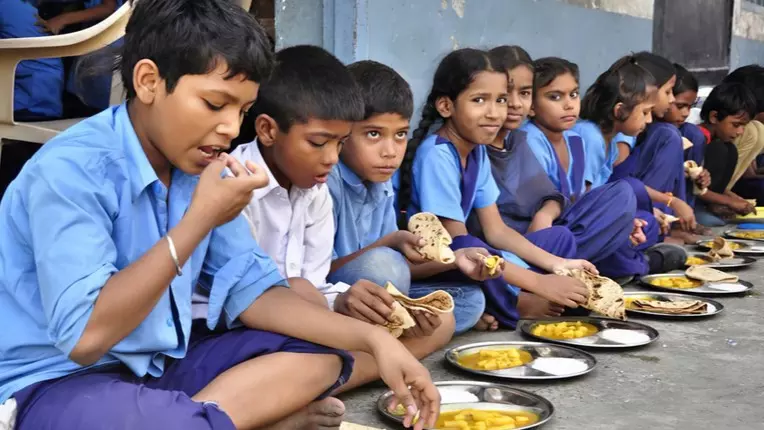TN mid-day meals: Nutrition is paramount, says Justice Chandru as activists oppose centralised kitchen idea
Tamil Nadu government can always try out his recommendation of a centralised kitchen in one block, get feedback, and then scale it up, he says

A group of economists, academics and activists wrote to Tamil Nadu Chief Minister MK Stalin on August 19, saying the state government ought not to implement one of the recommendations made by the Justice K Chandru Committee. The committee, set up to study caste violence in educational institutions, had submitted its report on June 18.
The Chandru committee found that many students skipped the breakfasts or mid-day meals provided at the school — at the behest of their parents — because they were cooked by Dalit women in the school kitchens. The committee also observed a lack of uniformity in the quality and nutritional value of the meals provided at various schools.
It, therefore, recommended that in-school meal preparation be replaced by centralised kitchens at the block level.
However, several activists, including well-known economist Jean Drèze, have objected to the proposal citing various reasons, which Justice Chandru has countered.
Dropping nutrition food levels
Responding to the objections raised by the activists, Justice Chandru slammed “some self-appointed experts that favour the existing set up”. “Are these petitioners not concerned about the nutrition level of the school children's food?" he asked.
Talking to The Federal, Justice Chandru pointed out that his report is a "recommendation". The Tamil Nadu government can always try out a centralised kitchen in one block and get feedback on the same before scaling it up, he said.
“My main concern is that children must get good quality and nutritious meals. Can these petitioners give a guarantee for these concerns?” he asked.
Lack of social audit
Further, he said, until now there has been no social audit of the mid-day meal scheme although it is four decades old.
“The petitioners’ letter does not talk about the mass pilferage, false attendance (the students' muster roll in the school is the basis for the number of children who eat but no physical verification is done) and the lack of quality and nutritional levels in the food supplied," he added.
Justice Chandru, who has written a 65-page report, flagged the two different control systems within a school dealing with matters related to children.
The midday meal workers are controlled by the Social Welfare Department, while the education matters are dealt with by the School Education Department. So, the teachers are not keen to supervise the mid-day meal scheme, he told The Federal.
More harm than good
The activists, in an open letter to Stalin, had said the state has a good record of pioneering and implementing school meals, and that replacing on-site cooking with centralised kitchens would clearly be a "step backward".
Pointing out that the experience of having centralised kitchens in other states is “quite sobering”, especially in rural areas, they said such kitchens would do “more harm than good”.
For one, it would amount to “caving in”. According to them, one of the primary reasons Justice Chandru was suggesting this move is to stop the discrimination against Dalit women cooking the mid-day meals.
A better approach would be to insist on the right of Dalit women to cook midday meals. When the administration stands firm, opposition tends to fizzle out and this helps to address the problem rather than evade it, said the letter.
Better accountability
The letter advocated on-site cooking claiming it promotes accountability because meals are cooked in front of students, teachers and even some parents, unlike centralised kitchens, where there is no public scrutiny.
The activists also cited how both the CAG and the Parliamentary Committee on Welfare of SCs and STs have expressed concern about irregularities in some of the country’s best-known centralised kitchens.
Further, they flagged the issue of centralised kitchens requiring additional expenditure for storage, transport, and also faced the danger of food getting spoilt en route to the schools.
"Food transported from centralised kitchens to schools tends to get cold and is less palatable to children. Reports from Jharkhand suggest that children have been throwing away food from centralised kitchens. In Rajasthan too, there were some such complaints some years ago," said the letter.
Apart from Drèze, the letter was signed by MP Senthil Sasikanth, researcher S Chella Rajan, educationist Prince Gajendra Babu, public health doctor Sylvia Karpagam, economist Reetika Khera, and activists Karuna Muthiah and T Ramakrishnan.
Dalit employees
The letter questioned the fate of the Dalit or Adivasi women currently employed at schools to cook meals. "On-site decentralised kitchens employ large numbers of poor women as cooks and helpers, 27 per cent of whom are Dalit or Adivasi women in Tamil Nadu. The Chandru commiƩee report suggests redeploying cooks and helpers in other public-sector jobs, but this is much easier said than done," it said.
The Chandru committee report had in fact suggested redeploying cooks and helpers in other public-sector jobs, but this is much easier said than done, said the letter. The report, however, had suggested that these women be redeployed in work relating to panchayats, panchayat unions, municipalities and corporations.
Also, the activists questioned the reliability of private contractors handling centralised kitchens, saying they would be more interested in making profits than in providing good nutrition to children.
